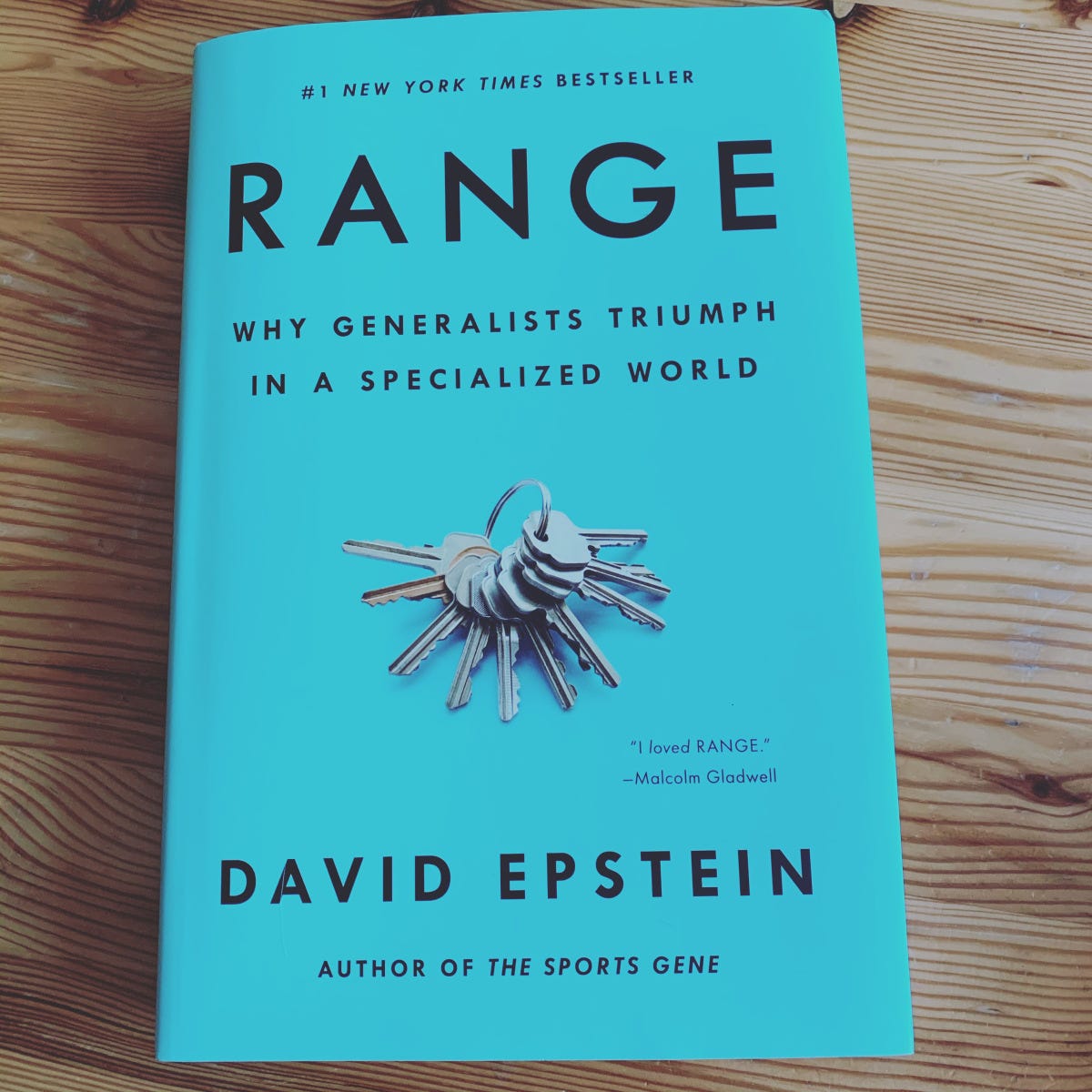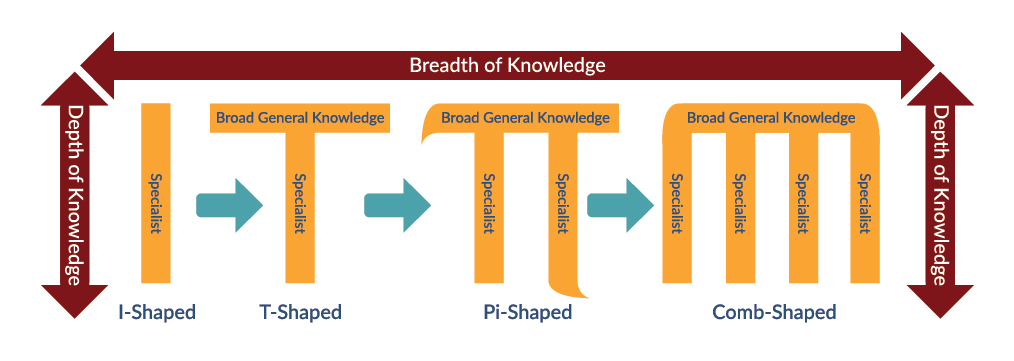Book- Range: Why Generalists Triumph in a Specialized World
My thoughts on the book Range by David Epstein

The aspect that I am most proud of during this Pandemic 2020 is reading, you must understand by now that I am an amateur when it comes to reading. I hardly read 2 books a year till now. But now in 2020, I was able to complete two books within the first half of the year, that’s a 100% improvement.
What’s the big deal about completing a book?

We are in a world where we have become information junkies, with the constant consumption of byte-sized information and short infographic videos. I am not blaming such sort of informative media, I am a huge consumer of such content, but those kinds of media give out the insights that your brain should have processed and arrived at.
This short-circuiting of information will help us know a lot of things superficially, but they don’t give you a deeper understanding. In order to avoid such short-circuiting of information, books help.
Reading a book taught me patience and perseverance. And above all, we need to remember that an author of a good book spends valuable years of his life to give the reader his masterpiece.
So I feel books are a great way to absorb information regarding the area of your interest and improve the quality of your life.
How I read the book?

This time I completely ditched the physical book and read the entire book on my iPad. I belonged to the school of thought that, somethings shouldn’t be influenced by technology, so a good old paperback book was always my preference. But this time I have completed the entire book on iPad, which helped me overcome the constraints of the cost of paperback book and accessibility. So, I have stopped using good old books to take notes and read books.
Range: Why Generalists Triumph in a Specialized World
Book by David Epstein

This book was suggested to me by my friend Rakesh. So, thanks to him for suggesting such a wonderful book.
Book in a Nutshell
We are always told; specialization is the way to go about in your career. The conventional narrative has always been, earlier we find our passion the better and we need to go deeper (deliberate practice) into our area of interest to become experts (10000-hour rule). This book negates that ideology. The author presents a strong case on why the current world problems need generalists who can connect ideologies and knowledge from different disciplines to innovate.
Shallow Dive into the Book
In this section, I will highlight ideologies that made me change my perspective and challenge my existing wisdom.
· Learning Environments

Kind Learning Environment: Chess, Golf, Jobs which have repetitive tasks.
Wicked Learning Environment: Most of the current world professions (Surgeon, Product Manager, CEO, Business Analyst, Politician, etc.)
In kind-domains like Chess and Golf, the patterns repeat themselves, the more deliberate practice the better.
In wicked domains, the rules of the game are often unclear or incomplete, there may or may not be repetitive patterns and they may not be obvious, and feedback is often delayed, inaccurate, or both.
So, the author highlights, in current world scenarios we often experience wicked learning environments, which can’t just be handled the same way we handle kind problems. Any computer program, programmed to play chess can beat the world’s greatest Grandmasters, in kind-problems, the patterns are repetitive and can be easily automated.
Take Away: Cultivate skills that help you face wicked problems with ease.
Skills to nurture: Lateral Thinking, Abstract Thinking
· Sampling Period

We often feel anxious that we haven’t found our true calling or passion, such passion when found, we can immerse into it and lose track of time. In most cases, we can’t find our passion in a single shot. The author highlights the concept of the sampling period before we fixate on something it’s better to sample over time.
Say for instance you want to be a musician it’s better to sample and play around with various instruments and figure out the underlying abstract structure before fixating on a single instrument.
If you want to be a technology leader your playground has to be technology where you are adamantly curious about a wide array of technologies, you sample skills and technologies over time (gaining breadth) before you start fixating on a single technology and go deeper (depth).

Take Away: Sample and experiment to become a T-Shaped person or even better M-Shaped or Polymath.
Skills to nurture: Interdisciplinary Knowledge (one way through books on a vast array of subjects) and learning things in different contexts. The habit of mind to dance across disciplines. The ability to solve Fermi problems.
· Analogical Thinking
David Epstein highlights the importance of analogical thinking and how recognizing conceptual similarities in multiple domains or scenarios that may seem to have little in common on the surface level.
“Analogical thinking takes the new and makes it familiar or takes the familiar and puts it in a new light and allows humans to reason through problems they have never seen in unfamiliar contexts.”
The author presents examples from astronomy to Medicine to show us the importance of Analogical Thinking in creative problem-solving.
· Match Quality

“Match quality” is a term economists use to describe the degree of fit between the work someone does and who they are—their abilities and proclivities.
With the concept of match quality, Epstein highlights the importance of sampling and how if we treated careers more like dating, nobody would settle down quickly.
The more you try and explore things the more the chances of you finding the job where you can put your skills to best use. The points to remember, momentous human personality changes occur from 18 to late 20s, so this should be treated as a trial period to acquire an understanding of the range of domains and disciplines. During the process of match quality optimization, you develop your breadth.
If each one of us tries to experiment in our careers and optimize the match quality, we would have workplaces bustling with innovation.
· Outsider Advantage

In most of the situations, organizations that have been leaders in certain domains fail to see the obvious problems or opportunities as they are so involved and hyperspecialized they fail to look at the problem with a new perspective.
If you take the example of the tech industry, Microsoft was the leader of computer software (operating system) so it should be obvious that they should have been the pioneers in mobile computing. Since Microsoft and its leadership was so immersed in their domain and business they failed to see the growth of mobile computing and eventually lost the race of mobile computing to outsiders like Google and Apple who had diversified product and service base.
Similarly, humans who are hyperspecialized in an area when presented with Novel problems fail to think out of the box to arrive at a solution.
· Lateral Thinking

“The solving of problems by an indirect and creative approach, typically through viewing the problem in a new and unusual light.”
Most of the innovators we have seen in the history are lateral thinkers, they bring in the knowledge and expertise from other domains to come with solutions never thought of before.
If we look at the example of Steve Jobs how he has integrated the idea of design with technology, to bring out exemplary hardware devices. Steve Jobs integrated the idea of artistic design with technology and challenged the tradition that computers don’t have to be ugly and clunky boxes, they can be as artistic and beautiful as an art piece in your showcase.
Inventors and innovators are often lateral thinking integrators, their innovations and products are a result of the integration of the breadth of their experiences.
Conclusion:
I have only discussed a few of the concepts discussed in the book, this book offers us a new perspective on why breadth is important how it helps in problem-solving, learning, and innovating. The book also discusses the best practices to acquire breadth or range with the help of anecdotes and historical evidence.
I wish I could have done a better job in highlighting the concepts of the book in a more structured manner, but owing to the plethora of knowledge in the book, it becomes hard to bring out the true essence of the book. Maybe in my later book dives, I will try to give out the accurate essence of the book.
This is by far one of the best books I have read, it cuts across subject areas like psychology, strategic management, problem-solving, and innovation.
If you wish to know the gist of the book, watch the TED talk by the writer of the book Range, David Epstein below.
Straight from the horse’s mouth !!
The next book I am going to read is Atomic Habits by James Clear.
-Sujan




New connections are in pipeline. Keep it up dear
Superb summary Sujan. Thanks for sharing. Good luck with the next book. 💥